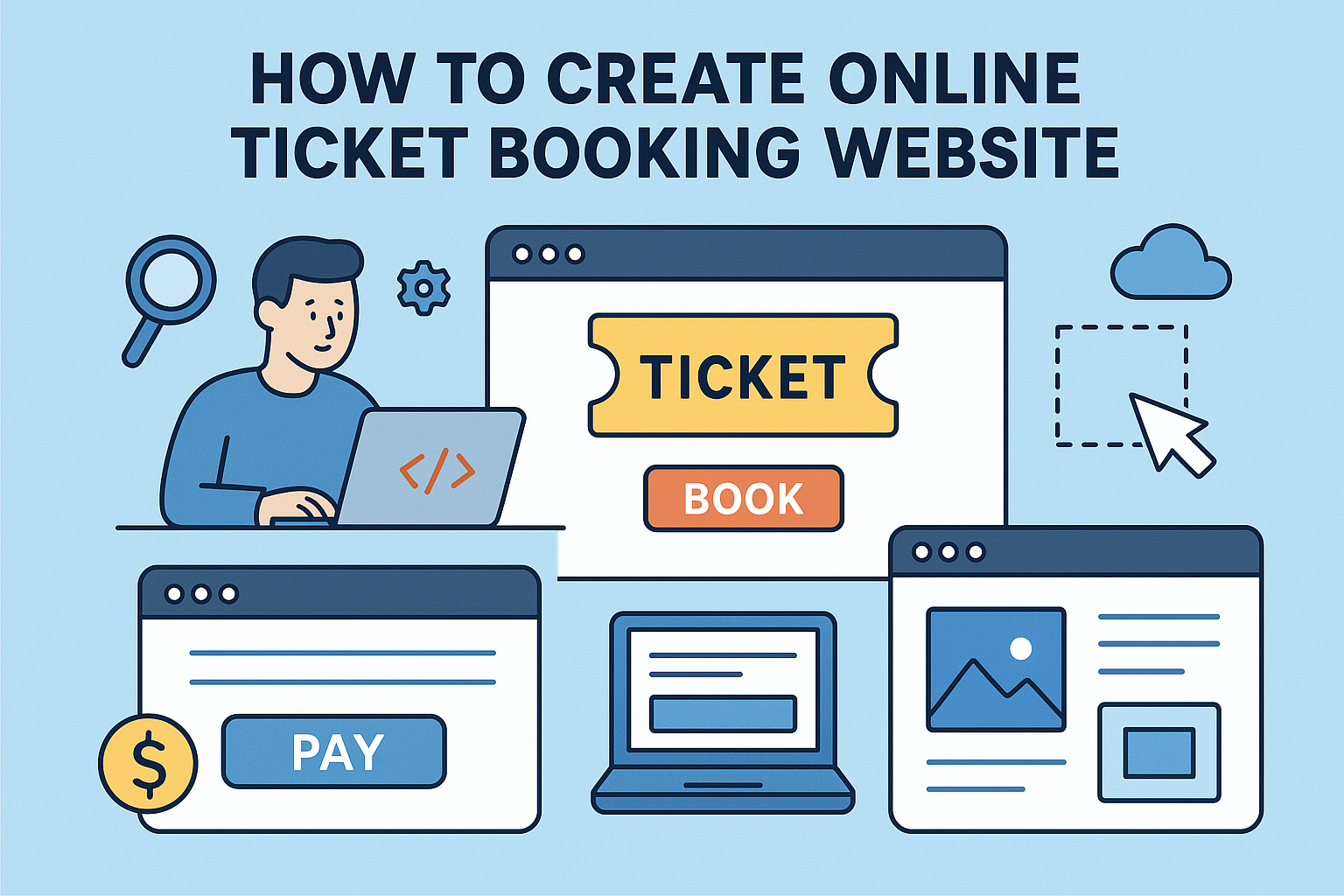The way people discover, book, and attend events has been transformed by technology. Whether it’s movies, concerts, workshops, sports matches, or conferences, audiences now expect seamless digital experiences for ticket reservations. For entrepreneurs and event organizers, learning how to create online ticket booking website is a game-changing opportunity.
In this guide, you’ll discover seven powerful tips to plan, design, and launch your own online ticket booking system or reservation platform, ensuring both convenience for users and profitability for your business.
Why Build an Online Ticket Booking Website?
Before we get into the “how,” let’s look at the “why”:
- Huge demand: Online ticketing is expected to continue rapid growth in 2025, with users preferring mobile and web solutions over offline counters.
- Automation: A good online ticket booking management system reduces manual errors, eliminates queues, and automates payments.
- Revenue growth: Event organizers can increase attendance by offering simple, user-friendly booking options.
- Scalability: From small local events to international shows, an online ticket booking system can serve any scale.
- Data insights: Collecting customer data helps organizers understand preferences and plan future events better.
Tip 1: Define Your Target Market and Event Niche
The first step in how to create an online ticket booking website is identifying who your audience is. You don’t need to cover every type of event from day one—focus on a niche first.
Examples of niches:
- Movies and theatre shows
- Music concerts and festivals
- Sports tournaments
- Business conferences and workshops
- Local community events
Defining a niche helps you craft features that matter most to your audience. Later, you can expand to become a broader ticket booking reservation platform.
Tip 2: Choose the Right Business Model
An online booking platform can generate revenue in multiple ways. Before building, you need clarity on how you’ll monetize.
Common business models include:
- Commission per ticket: Charging event organizers a percentage of each ticket sold.
- Subscription model: Event organizers pay monthly/annual fees to use your online ticket booking system.
- Advertisement revenue: Display event promotions and sponsored ads.
- Premium features: Offer organizers value-added services like highlighted event listings or analytics dashboards.
Selecting a model early influences the features and payment structures you’ll need to build.
Tip 3: Plan Essential Features for Users and Organizers
A successful online ticket booking management system should cater to both event-goers and event organizers.
For Users
- Event discovery with filters (category, date, location)
- Real-time seat selection and availability tracking
- Secure payment gateways (credit card, UPI, wallets, etc.)
- E-tickets with QR codes or barcodes
- Notifications and reminders
- Social sharing of booked events
For Organizers
- Event creation and management dashboard
- Seat mapping and capacity control
- Real-time sales analytics
- Customizable ticket pricing and offers
- Attendee management with check-in features
For Admins
- User and organizer verification
- Fraud prevention systems
- Financial reporting tools
- Dispute resolution system
This balance ensures your online ticket reservation platform delivers value to everyone involved.
Tip 4: Select the Right Technology Stack
The foundation of your platform lies in choosing the right technology.
- Frontend: React, Vue.js, or Angular for dynamic, responsive interfaces.
- Backend: Node.js, Django, or Laravel for scalable performance.
- Database: MySQL or MongoDB for storing event, user, and booking data.
- Payment integration: Stripe, Razorpay, or PayPal APIs.
- Hosting: Cloud platforms like AWS or Google Cloud for stability.
- Additional APIs: Google Maps for venue locations, Twilio for SMS confirmations.
A carefully chosen stack ensures your online ticket booking system is fast, reliable, and secure.
Tip 5: Focus on Seamless User Experience (UX)
The best online ticket booking systems thrive because they’re intuitive and easy to use. Here’s how to design yours for maximum success:
- Mobile-first design: Most users will book tickets on their phones.
- Clear navigation: Categories, dates, and filters should be simple.
- Fast checkout: Reduce clicks from discovery to booking.
- Interactive seat maps: Allow users to pick seats visually.
- Personalization: Suggest events based on browsing history.
Smooth UX not only improves customer satisfaction but also increases repeat bookings.
Tip 6: Implement Strong Security and Reliability Measures
Trust is non-negotiable when handling payments and personal data. For your online ticket reservation platform, you must:
- Use SSL certificates for data encryption.
- Implement two-factor authentication for organizers and admins.
- Ensure PCI DSS compliance for secure payments.
- Use fraud detection systems to prevent fake bookings.
- Build strong backup and recovery protocols to avoid data loss.
By prioritizing security, you build confidence among users and organizers.
Tip 7: Market Your Platform Effectively
Even the most well-built online ticket booking system won’t succeed without visibility. Here are strategies to grow your audience:
- SEO optimization: Rank for local and niche keywords like “concert tickets in [city]” or “workshop bookings.”
- Content marketing: Publish event guides, interviews with organizers, or “Top 10 events this month” lists.
- Social media campaigns: Leverage Instagram, TikTok, and Facebook for event promotions.
- Email marketing: Send personalized event recommendations.
- Referral programs: Reward users for inviting friends.
- Partnerships: Collaborate with local venues and event organizers.
The goal is to establish your platform as the go-to online ticket booking management system for both users and organizers.
Challenges to Anticipate
Building a ticket booking site isn’t without challenges. Some common issues include:
- High competition: Established players dominate; differentiation is key.
- Scalability issues: Handling traffic spikes during popular event launches.
- Fraudulent activities: Fake users, chargebacks, and ticket reselling.
- User retention: Encouraging repeat bookings requires loyalty strategies.
Addressing these early helps your platform stay strong and credible.
The Future of Online Ticket Booking
Looking ahead, online ticket booking systems are set to become more advanced with these innovations:
- AI-driven recommendations: Personalized event suggestions based on interests.
- Voice-assisted booking: Integration with smart assistants like Alexa or Google Assistant.
- Blockchain-based tickets: Secure, tamper-proof digital tickets.
- Augmented reality (AR): Visualizing event layouts or seat views before booking.
- Integration with metaverse events: Allowing booking for virtual concerts and conferences.
By staying ahead of these trends, your platform can remain competitive in the evolving digital landscape.
Conclusion
Learning how to create an online ticket booking website requires a clear vision, the right technology, and a user-first approach. By focusing on niche markets, planning features carefully, prioritizing security, and executing smart marketing, you can build a powerful online ticket booking system that serves both event-goers and organizers.
Whether your goal is to create a niche ticket reservation platform or scale into a full online booking management system, success lies in balancing technology with user trust.
For those who want to bring their idea to life with expert guidance, findthecoder can help you design, develop, and scale a professional online ticket booking website tailored to your business goals.

